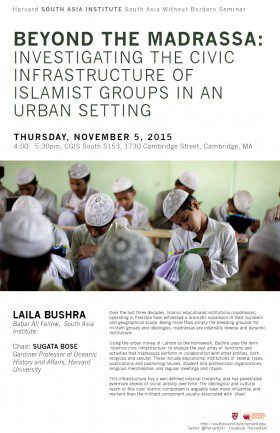South Asia Without Borders Seminar
Laila Bushra, Babar Ali Fellow, South Asia Institute
Chair: Sugata Bose, Gardiner Professor of Oceanic History and Affairs, Harvard University
Over the last three decades, Islamic educational institutions (madrassas) operating in Pakistan have witnessed a dramatic expansion in their numbers and geographical scope. Being more than simply the breeding grounds for militant groups and ideologies, madrassas are internally diverse and dynamic institutions. Using the urban milieu of Lahore as the framework, Bushra uses the term ‘Islamist civic infrastructure’ to analyze the vast array of functions and activities that madrassas perform in collaboration with other entities, both religious and secular. These include educational institutions of several types, publications and publishing houses, student and professional organizations, religious merchandise, and regular meetings and rituals. This infrastructure has a well-defined internal hierarchy, and has penetrated evermore arenas of social activity over time. The ideological and cultural reach of this civic Islamic component is arguably even more influential and resilient than the militant component usually associated with ‘jihad’.

